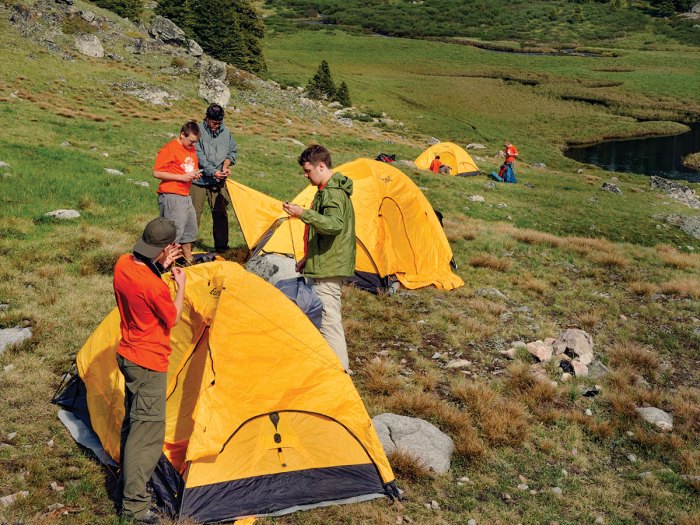How to Choose a Safe and Comfortable Campsite

Picking a place to pitch a tent isn’t always simple. You could find a flat spot, but the site might be in a low-lying area and prone to flooding if it rains a lot.
To find a place you can safely and comfortably sleep and eat outdoors, consider these nine factors:
Environmental Impact
Use established campsites whenever you can, or camp on durable surfaces that won’t be damaged by you and your fellow Scouts when walking around. If you must move objects, like logs or rocks, return everything to its original spot before you leave.
Safety
Pitch your tent away from dead trees or trees with limbs that might fall in a storm. Avoid camping near lone trees, mountaintops, high ridges and other likely lightning targets.
Find a site away from low-lying places that could fill with water during a flash flood, such as valleys, canyons and banks of small, shallow rivers. Some signs of these areas are debris caught in underbrush or grass bent over in the same direction. Higher ground can be dangerous if you see signs of erosion.
Size
Find a place big enough for your patrol to set up its tents, and cook meals in separate areas. Also, make sure there is enough space to move around without tripping over tent stakes and guylines.
Comfort
In the summer, look for a shady site where breezes can help cool your tent and chase away mosquitoes. In the winter, find a site where trees and hillsides provide a natural windbreak. Regardless of the time of year, place your tent on the flattest spot possible.
Water
You’ll need plenty of water for drinking, cooking and cleaning. Public water supplies are the safest and can be found in most frontcountry campsites. Water from streams, rivers or lakes should be properly treated before use. In some dry places, you might need to carry all your water to camp.
Fire
Where fires are not allowed or where wood is scarce, plan on using a camp stove to heat water and cook food. Where fires are permitted, look for a campsite with an existing fire ring. Use firewood that is dead and down; never cut live trees.
Privacy
Respect the privacy of others by selecting campsites away from theirs. Trees, bushes and the shape of the terrain can screen your camp from trails and neighboring campsites. Keep noise down so you won’t disturb nearby campers, and respect quiet hours at public campgrounds and Scout camps.
Terrain
Make sure your site has good drainage, natural ground cover and enough sunlight for visibility.
Permission
Check ahead of time with public parks, forest and reserves. They can issue any permits you will need. Never camp on private property without permission.
Leave a Comment